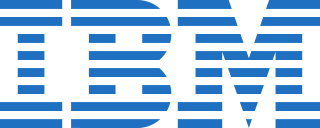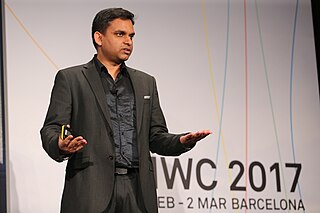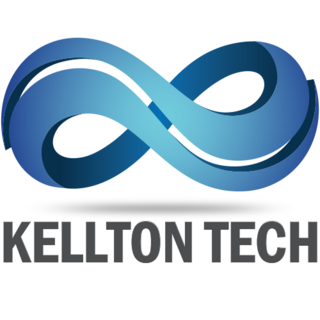
IBM Services is the professional services arm of IBM, made up of business, technology and industry experts who apply advanced technology and help clients design, build and run businesses. It includes two divisions: IBM Global Business Services (GBS) and IBM Global Technology Services (GTS).
ThoughtWorks is a privately owned, global technology company with 43 offices in 14 countries. It provides software design and delivery, and tools and consulting services. The company is closely associated with the movement for agile software development, and has contributed to a content of open source products. ThoughtWorks is a leader in Digital Product Development Services, Digital Experience and Distributed Agile software development.
A hackathon is a design sprint-like event; often, in which computer programmers and others involved in software development, including graphic designers, interface designers, project managers, domain experts, and others collaborate intensively on software projects.
Private Sector Development (PSD) is a term in the international development industry to refer to a range of strategies for promoting economic growth and reducing poverty in developing countries by building private enterprises. This could be through working with firms directly, with membership organisations to represent them, or through a range of areas of policy and regulation to promote functioning, competitive markets.
Google.org, founded in October 2005, is the charitable arm of Google, a multinational technology company. The organization has committed roughly US$100 million in investments and grants to nonprofits annually.
Katzenbach Partners was a small American management consulting firm. In 2009 it became a part of the global management consulting firm Booz & Company.

Innovations for Poverty Action (IPA) is an American non-profit research and policy organization founded in 2002 by economist Dean Karlan. Since its foundation, IPA has worked with over 400 leading academics to conduct over 600 evaluations in 51 countries. The organization also manages the Progress out of Poverty Index.
The Utah Science Technology and Research Initiative (USTAR) is a technology-based economic development agency funded by the state of Utah. The organization works to develop ideas and research into marketable products and successful companies through its competitive grant and entrepreneur support programs. USTAR facilitates the diversification of the state’s tech economy, increases private follow-on investment, and supports the creation of technology-based start-up firms, higher paying jobs and additional business activity leading to a statewide expansion of Utah’s tax base.

The Abdul Latif Jameel Poverty Action Lab (J-PAL) is a global research center working to reduce poverty by ensuring that policy is informed by scientific evidence. J-PAL conducts randomized impact evaluations to answer critical questions in the fight against poverty, and builds partnerships with governments, NGOs, donors, and others to generate new research, share knowledge, and scale up effective programs. As of 2018, more than 400 million people have been reached by scale-ups of programs found to be effective by J-PAL affiliates’ research.

Leila Janah was an American businesswoman. She was the founder and CEO of Samasource and LXMI, two companies which share a common social mission to end global poverty by giving work to people in need. Samasource's 11,000 employees have worked under contracts with companies including Microsoft, Google, Facebook, Walmart, Getty Images, Glassdoor and Vulcan Capital.

Kenexa, an IBM Company, provides employment and retention services. This includes recruitment process outsourcing onboarding tools, employee assessment, abilities assessment for employment candidates ; and Kenexa Interview Builder, a structured interview archive with example questions.
Microwork is a series of small tasks which together comprise a large unified project, and are completed by many people over the Internet. Microwork is considered the smallest unit of work in a virtual assembly line. It is most often used to describe tasks for which no efficient algorithm has been devised, and require human intelligence to complete reliably. The term was developed in 2008 by Leila Chirayath Janah of Samasource.
Impact sourcing, also known as socially responsible outsourcing, refers to an arm of the business process outsourcing (BPO) industry that employs people at the base of the pyramid or socioeconomically disadvantaged individuals as principal workers in business process outsourcing centers to provide high-quality, information-based services to domestic and international clients. The traditional BPO sector is typically associated with high-end, high-contact functions like call centers, which require significant levels of education and language literacy. The impact sourcing sector focuses on utilizing workers from poor and vulnerable communities to perform functions with lower and moderate skill requirements such as scanning documents, data entry work, data verification and cleaning, video tagging, and microwork.
DueDil is a company intelligence platform covering the SME economy. DueDil uses proprietary matching technology to link billions of company data points from authoritative sources, providing unique insight through its Business Information Graph.

Coursera is an American massive open online course (MOOC) provider founded in 2012 by Stanford University's computer science professors Andrew Ng and Daphne Koller that offers massive open online courses (MOOC), specializations, degrees, professional and mastertrack courses.
General Assembly is a private, for-profit education organization founded by CEO Jake Schwartz, Adam Pritzker, Matthew Brimer, and Brad Hargreaves in early 2011. It maintains campuses in numerous countries throughout the world to teach entrepreneurs and business professionals practical technology skills. It provides courses in mobile and software engineering, data science, product management, and other digital-related courses.
Degreed is an education technology company that is engaged in enabling and recognizing professional and lifelong learning and skills. The platform allows users to learn, develop and measure their skills. Degreed is free for individuals. An enhanced version, Degreed for Enterprise, connects internal learning and talent systems to worldwide ecosystems of free, open and paid learning resources, and is available to organizations for a fee as a hosted, cloud-based solution. Degreed is based in San Francisco, CA with offices in Salt Lake City, UT and Leiden, The Netherlands.
Fast Forward is the first startup accelerator to focus solely on nonprofit-based technology enterprises, it was founded by Shannon Farley and Kevin Barenblat in 2014. The accelerator provides support, mentorship, and access to financial capital for emerging companies that aim to improve the world, by focusing on poverty, education access, improving health, and environmental degradation.

Sangeet Paul Choudary is a business scholar, entrepreneur, advisor and author. He is best known for his work on platform economics and network effects. He is the co-author of the book Platform Revolution: How Networked Markets Are Transforming the Economy and How to Make Them Work for You.

Kellton Tech Solutions Ltd. (KTSL) is an Indian information technology and outsourcing company headquartered in Hyderabad, India with offices in United States and Europe.The company reported net revenues of Rs. 7.39 billion with more than 1400 employees.







